2020-07-23: Time is fast running out. You have to ask yourself: “Do I feel lucky ? Am I a GreenWasher“ – do I enjoy playing with numbers, relaxing with estimates having tenuous links to reality, cheating the ‘system’ (just like Germany’s Dieselgate), or convincing myself (and everybody else) that progress is being made when the evidence clearly shows that things are getting worse … “or an Implementor ??” – establishing meaningful Benchmarks, setting (and iteratively re-setting) ambitious Performance Targets using reliable, up-to-date data and statistics, then closely monitoring Positive Progress, and reporting Real Verifiable Results …
.

.
In 2015 … 193 World Leaders, representing all of the United Nations’ Member States, adopted a set of 17 Sustainable Development Goals (SDG’s) … placing our world, i.e. its people, environment and limited resources, on a path towards a more sustainable future … more specifically, aiming to ‘free humanity from poverty, secure a healthy planet for future generations, and build peaceful, inclusive societies as a foundation for ensuring lives of dignity for all’.
To properly track the implementation of these consensus goals … reliable, quality, and timely data is vital. Yet, five years later too much of the data is still out-of-date or unavailable, and too many people are being left behind in the numbers. Half of the data used to measure the SDG Target Performance Indicators are missing. Two-thirds of poverty data from Sub-Saharan Africa and global deforestation figures are five years out-of-date. Only 100 countries in the world have nationally-representative data on violence against women, and more than 25 million refugees around the world go uncounted in national statistics.
.
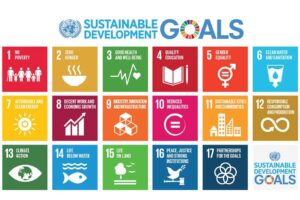
.
With only 10 years left to achieve the SDG Targets, there is a critical need NOW for a Data Platform which makes quality and timely data for the SDG’s Accessible to All, improves knowledge of geospatial tools and Geographic Information Systems (#GIS), and builds capacity to use these tools to support global policy and decision making …
SDG’s Today: Global Portal for Real-Time Data
In partnership with the Environmental Systems Research Institute (#ESRI) and National Geographic … SDG’s Today: Global Portal for Real-Time Data … is a platform developed by the Sustainable Development Solutions Network (#SDSN). This one-of-a-kind open access data platform has the potential to revolutionize how we understand and communicate the urgency of the SDG’s and how solutions are developed, by providing a much-needed virtual space where key stakeholders from around the world can access and engage with timely data (updated annually or in more frequent intervals) on the SDG’s, and learn how to use the data effectively to push Agenda 2030 forward. The platform also houses GIS training and education resources and supports countries and other institutions to produce, share, and engage with the data to help ensure that, together, we meet the global goals by 2030.
.
Using Data To Effectively Implement The UN 2030 Agenda for Sustainable Development …
2020 Research Paper: Towards Nexus-Based Governance – Defining Interactions Between Economic Activities and Sustainable Development Goals (Download PDF File, 2.56 MB)
.
Using Data To Check The Status of Claimed Progress Within The European Union …
European Court of Auditors – Special Report 11 – April 2020
EU Energy Efficiency in Buildings: Greater Focus on Cost-Effectiveness Still Needed (Download PDF File, 4.52 MB)
The Court of Auditors assessed whether EU co-funded energy efficiency investments in buildings had cost-effectively helped the EU towards meeting its 2020 energy saving target. The Auditors concluded that operational programmes and project selection were not driven by a cost-effectiveness rationale. While Member States required buildings to be renovated to save a minimum of energy and improve their energy rating, this sometimes happened at a high cost. Because of a lack of comparative assessment of project merits and of minimum/maximum thresholds for cost-effectiveness, projects delivering higher energy savings or other benefits at lower cost were not prioritised. In overly-polite language, they recommend improving the planning, selection and monitoring of investments to improve the cost-effectiveness of spending.
With all of the Hot Air and Ridiculous Hoopla about improving Energy Conservation and Efficiency in New Buildings (Green, BREEAM, PassivHaus, LEED, nZEB, etc., etc.) … by far the biggest Energy Problem is with Europe’s Existing Building Stock. This Auditor’s Report shows that Progress in Meeting Agreed EU Targets is dismal, and there is still a cynical approach in Member States to the use of EU Funding …
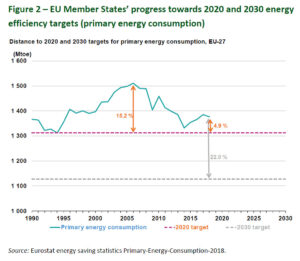
.
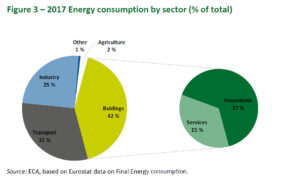
.
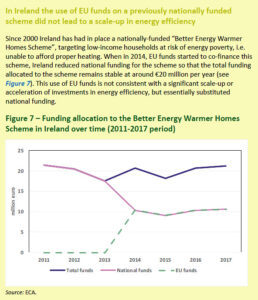
.
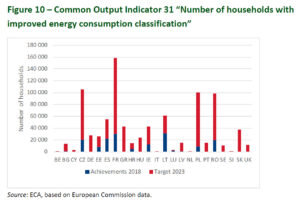
.
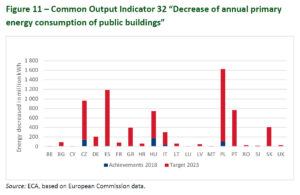
.
.
END
#Twitter … @walshcj69 …
#Sustainability #SustainableDevelopmentGoals #SDG’s #SDGimplementation #SDGtargets #SDGperformanceIndicators #HumanRights #ResponsibleNeeds #RealTimeData #EffectiveImplementation #Governance #GreenWashing #Implementor #EU #EnergyEfficiency #EUcourtOfAuditors
